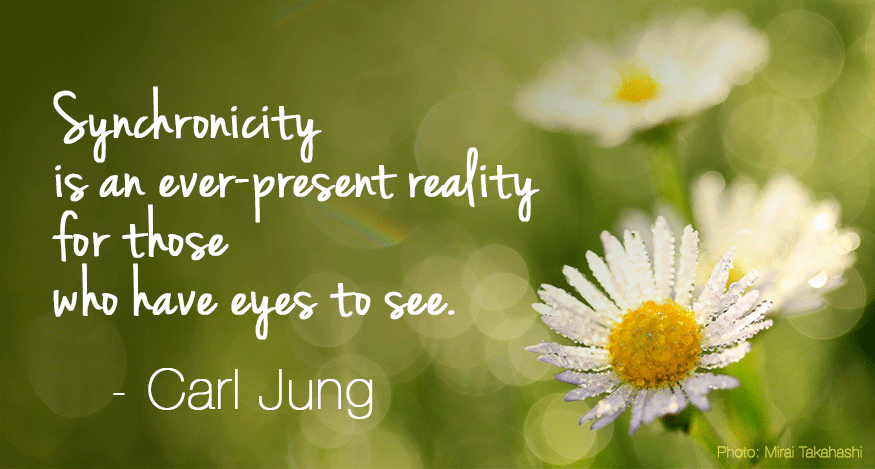Synchronicities? Is There A Relationship With Scams?
By Tim McGuinness, Ph.D. – Anthropologist, Scientist, Director of the Society of Citizens Against Relationship Scams Inc.
Synchronicities: For Scam Victims Coincidences Are Everywhere! Or Are They?
What are Synchronicities?
Synchronicities are meaningful coincidences or occurrences that seemingly have no causal relationship but are deeply resonant or significant to the individuals experiencing them. These events often appear as striking coincidences, where multiple events or circumstances align in a way that feels meaningful or purposeful.
Synchronicities can have a profound impact on scam victims before, during, and after the scam. While they can contribute to the victim’s vulnerability and emotional investment during the scam, synchronicities experienced post-scam can serve as transformative moments for growth, self-reflection, and rebuilding one’s life. It is important to approach synchronicities with a balanced perspective and support victims in their journey toward healing and recovery.
Carl Jung’s View of Synchronicities
Carl Jung, a Swiss psychiatrist, and psychoanalyst, coined the term “synchronicity” to describe meaningful coincidences that are not causally related. He believed that synchronicities are not simply random events, but rather they are meaningful coincidences that have a deeper significance.
Jung believed that synchronicities are a way for the unconscious mind to communicate with the conscious mind. He believed that the unconscious mind is constantly sending us messages, but we are often not aware of them. Synchronicities are a way for the unconscious mind to get our attention and to make us aware of its messages.
Jung believed that synchronicities were not mere coincidences but rather expressions of the collective unconscious, a reservoir of shared symbols, archetypes, and experiences that underlie human consciousness. He proposed that synchronicities were the result of an underlying order or a deeper level of reality beyond the realm of cause and effect.
Jung believed that synchronicities can be interpreted in a number of ways. They can be seen as a sign from the universe, a message from our higher selves, or a confirmation of our beliefs. They can also be seen as a way for us to connect with the larger world around us.
According to Jung, synchronicities occur when an individual’s psyche is attuned to the larger patterns of the collective unconscious. They represent a bridge between the inner world of thoughts, emotions, and intuitions and the outer world of objective events. Synchronistic events often carry symbolic or archetypal meanings that can provide insights, guidance, or a sense of meaning to an individual’s life.
Jung emphasized the importance of paying attention to synchronicities and engaging with them as meaningful experiences. He saw them as opportunities for self-discovery, personal growth, and connecting with a deeper sense of purpose. By exploring the synchronicities in one’s life, individuals could gain a better understanding of their own psyche, uncover hidden aspects of themselves, and move towards individuation—the process of becoming a fully integrated and authentic self.
Jung’s view of synchronicity has been controversial. Some people believe that it is a legitimate phenomenon, while others believe that it is simply a coincidence. There is no scientific evidence to support Jung’s claims, but many people find his theory to be meaningful and helpful.
Here are some examples of synchronicities that Jung may have considered to be meaningful:
- You are thinking about a friend you haven’t seen in years, and then you run into them on the street.
- You have a dream about a car accident, and then the next day you hear about a car accident that happened in your neighborhood.
- You are reading a book about a particular topic, and then you see a news article about the same topic.
- You are thinking about a particular song, and then you hear it on the radio.
Jung believed that synchronicities are a way for us to connect with the larger world around us. They can be seen as a sign from the universe, a message from our higher selves, or a confirmation of our beliefs. If you experience a synchronicity, take some time to reflect on its meaning. What message might it be trying to tell you?
How do Synchronicities Relate to Scams & Scam Victims?
With scam victims, synchronicities can play a complex role before, during, and after the scam.
Synchronicities Before The Scam
Before falling victim to a scam, individuals may experience synchronicities that unknowingly set the stage for their susceptibility to this type of crime. These synchronicities can involve chance encounters online, serendipitous events, or a series of circumstances that align to create an environment where individuals are more susceptible to manipulation or deception.
Synchronicities During The Scam
During the scam, synchronicities can continue to manifest, further solidifying the illusion and deepening the victim’s trust in the scammer. These synchronicities may include seemingly fortuitous events that reinforce the scammer’s credibility or reinforce the victim’s emotional investment in the fraudulent relationship. They can create a sense of magical thinking or a belief that the scam is fated, which can be difficult for the victim to critically evaluate.
Synchronicities After The Scam
After the scam ends, synchronicities may take on a different significance. Victims may experience synchronistic events that trigger reflection, self-discovery, or a renewed sense of purpose. These synchronicities can act as catalysts for personal growth, leading victims to reevaluate their beliefs, priorities, and relationships. They can serve as reminders of the lessons learned from the scam and empower victims to make positive changes in their lives.
Avoiding Self-Blame
When individuals fall victim to scams, they often experience a range of emotions, including guilt, self-blame, and a sense of personal failure. They may question their judgment, intelligence, or naivety, which can significantly impact their self-esteem and overall well-being – resulting in shame and guilt.
Understanding synchronicities can offer an alternative perspective for scam victims. It helps them recognize that the circumstances leading up to their victimization involved more than just their personal choices or vulnerabilities. Synchronicities highlight the interplay between external events and their internal psychological state, suggesting that the scam was influenced by factors beyond their control.
From another point of view, synchronicities demonstrate that what victims often believe to be certainties before, during, and after the scam – and for that reason blame themselves – are really nothing but uncertainties.
By considering synchronicities, victims can shift their focus from self-blame to a broader understanding of the complex dynamics at play during the scam. They can begin to recognize that they were targeted by skilled manipulators who exploited vulnerabilities and utilized psychological tactics. This understanding can help victims reframe their self-perception, realizing that they were not responsible for the scam but rather caught in a web of deceit.
Additionally, embracing synchronicities as meaningful experiences can provide scam victims with a sense of meaning and purpose amidst their challenging circumstances. It offers an opportunity to view the scam as part of their life journey, from which they can learn, grow, and emerge stronger. Synchronicities may prompt victims to engage in self-reflection, explore their own beliefs and values, and find new directions for personal development and healing.
Final Word
Synchronicities are not hard science, they are more of a philosophical understanding of the forces at play in the universe.
it is essential to approach synchronicities with a balanced perspective, combining psychological understanding with critical thinking. While synchronicities can offer insights and alleviate self-blame, it is crucial to complement this perspective with education, support, and professional guidance. Victim blaming is never justified, and a comprehensive approach to recovery involves addressing the emotional, psychological, and practical aspects of the scam experience.
Ultimately, an understanding of synchronicities can be a tool for scam victims to shift their self-perception, foster self-compassion, and embrace the possibilities of growth and healing.
It is also important to note that synchronicities do not validate or justify the actions of scammers, nor do they absolve them of responsibility. Synchronicities are subjective experiences and should be approached with discernment and critical thinking. Victims should be encouraged to seek support, professional guidance, and education to process their experiences and gain clarity.

More ScamsNOW.com Articles
-/ 30 /-
What do you think about this?
Please share your thoughts in a comment below!
SCARS LINKS: AgainstScams.org RomanceScamsNOW.com ContraEstafas.org ScammerPhotos.com Anyscam.com ScamsNOW.com
reporting.AgainstScams.org support.AgainstScams.org membership.AgainstScams.org donate.AgainstScams.org shop.AgainstScams.org
youtube.AgainstScams.org linkedin.AgainstScams.org facebook.AgainstScams.org
TABLE OF CONTENTS
CATEGORIES
![NavyLogo@4x-81[1] Synchronicities? Is There A Relationship With Scams?](https://scamsnow.com/wp-content/uploads/2025/04/NavyLogo@4x-811.png)
ARTICLE META
Important Information for New Scam Victims
- Please visit www.ScamVictimsSupport.org – a SCARS Website for New Scam Victims & Sextortion Victims.
- SCARS Institute now offers its free, safe, and private Scam Survivor’s Support Community at www.SCARScommunity.org – this is not on a social media platform, it is our own safe & secure platform created by the SCARS Institute especially for scam victims & survivors.
- SCARS Institute now offers a free recovery learning program at www.SCARSeducation.org.
- Please visit www.ScamPsychology.org – to more fully understand the psychological concepts involved in scams and scam victim recovery.
If you are looking for local trauma counselors, please visit counseling.AgainstScams.org
If you need to speak with someone now, you can dial 988 or find phone numbers for crisis hotlines all around the world here: www.opencounseling.com/suicide-hotlines
Statement About Victim Blaming
Some of our articles discuss various aspects of victims. This is both about better understanding victims (the science of victimology) and their behaviors and psychology. This helps us to educate victims/survivors about why these crimes happened and not to blame themselves, better develop recovery programs, and help victims avoid scams in the future. At times, this may sound like blaming the victim, but it does not blame scam victims; we are simply explaining the hows and whys of the experience victims have.
These articles, about the Psychology of Scams or Victim Psychology – meaning that all humans have psychological or cognitive characteristics in common that can either be exploited or work against us – help us all to understand the unique challenges victims face before, during, and after scams, fraud, or cybercrimes. These sometimes talk about some of the vulnerabilities the scammers exploit. Victims rarely have control of them or are even aware of them, until something like a scam happens, and then they can learn how their mind works and how to overcome these mechanisms.
Articles like these help victims and others understand these processes and how to help prevent them from being exploited again or to help them recover more easily by understanding their post-scam behaviors. Learn more about the Psychology of Scams at www.ScamPsychology.org
SCARS INSTITUTE RESOURCES:
If You Have Been Victimized By A Scam Or Cybercrime
♦ If you are a victim of scams, go to www.ScamVictimsSupport.org for real knowledge and help
♦ SCARS Institute now offers its free, safe, and private Scam Survivor’s Support Community at www.SCARScommunity.org/register – this is not on a social media platform, it is our own safe & secure platform created by the SCARS Institute especially for scam victims & survivors.
♦ Enroll in SCARS Scam Survivor’s School now at www.SCARSeducation.org
♦ To report criminals, visit https://reporting.AgainstScams.org – we will NEVER give your data to money recovery companies like some do!
♦ Follow us and find our podcasts, webinars, and helpful videos on YouTube: https://www.youtube.com/@RomancescamsNowcom
♦ Learn about the Psychology of Scams at www.ScamPsychology.org
♦ Dig deeper into the reality of scams, fraud, and cybercrime at www.ScamsNOW.com and www.RomanceScamsNOW.com
♦ Scam Survivor’s Stories: www.ScamSurvivorStories.org
♦ For Scam Victim Advocates visit www.ScamVictimsAdvocates.org
♦ See more scammer photos on www.ScammerPhotos.com
You can also find the SCARS Institute’s knowledge and information on Facebook, Instagram, X, LinkedIn, and TruthSocial
Psychology Disclaimer:
All articles about psychology and the human brain on this website are for information & education only
The information provided in this and other SCARS articles are intended for educational and self-help purposes only and should not be construed as a substitute for professional therapy or counseling.
Note about Mindfulness: Mindfulness practices have the potential to create psychological distress for some individuals. Please consult a mental health professional or experienced meditation instructor for guidance should you encounter difficulties.
While any self-help techniques outlined herein may be beneficial for scam victims seeking to recover from their experience and move towards recovery, it is important to consult with a qualified mental health professional before initiating any course of action. Each individual’s experience and needs are unique, and what works for one person may not be suitable for another.
Additionally, any approach may not be appropriate for individuals with certain pre-existing mental health conditions or trauma histories. It is advisable to seek guidance from a licensed therapist or counselor who can provide personalized support, guidance, and treatment tailored to your specific needs.
If you are experiencing significant distress or emotional difficulties related to a scam or other traumatic event, please consult your doctor or mental health provider for appropriate care and support.
Also read our SCARS Institute Statement about Professional Care for Scam Victims – click here
If you are in crisis, feeling desperate, or in despair, please call 988 or your local crisis hotline – international numbers here.
More ScamsNOW.com Articles
A Question of Trust
At the SCARS Institute, we invite you to do your own research on the topics we speak about and publish. Our team investigates the subject being discussed, especially when it comes to understanding the scam victims-survivors’ experience. You can do Google searches, but in many cases, you will have to wade through scientific papers and studies. However, remember that biases and perspectives matter and influence the outcome. Regardless, we encourage you to explore these topics as thoroughly as you can for your own awareness.

























![scars-institute[1] Synchronicities? Is There A Relationship With Scams?](https://scamsnow.com/wp-content/uploads/2025/04/scars-institute1.png)

![niprc1.png1_-150×1501-1[1] Synchronicities? Is There A Relationship With Scams?](https://scamsnow.com/wp-content/uploads/2025/04/niprc1.png1_-150x1501-11.webp)